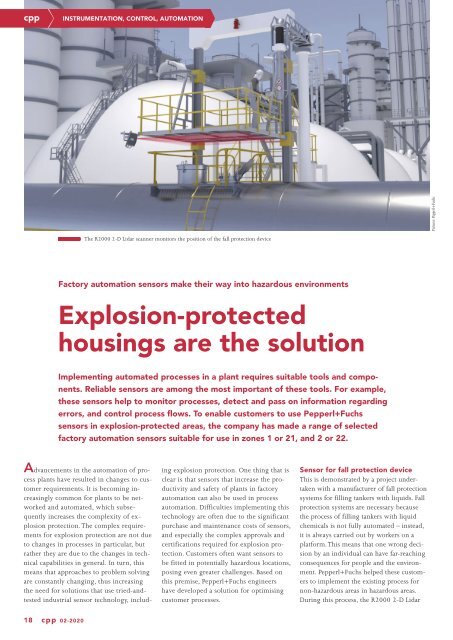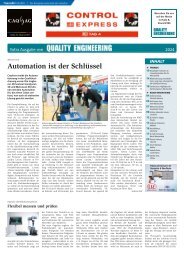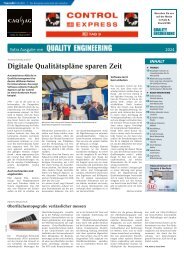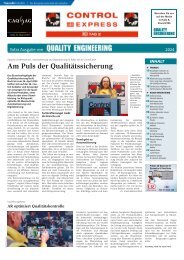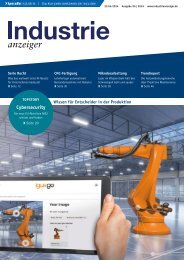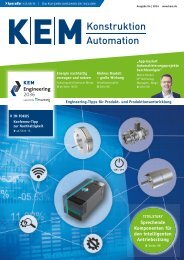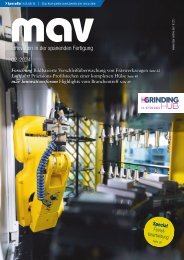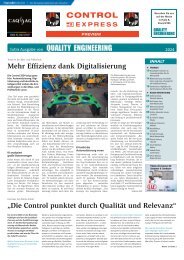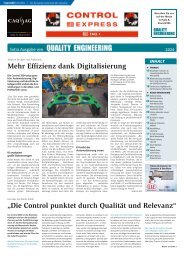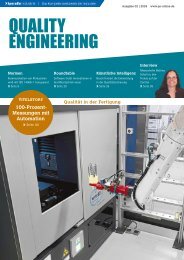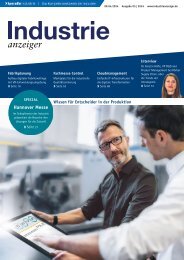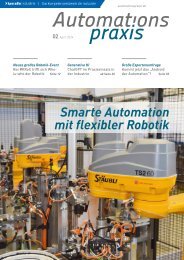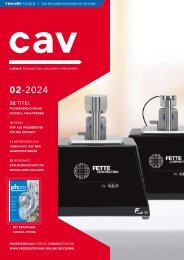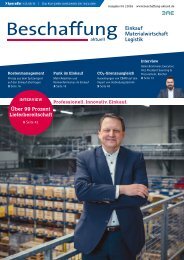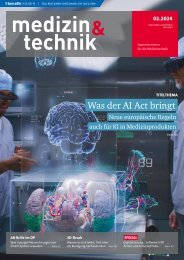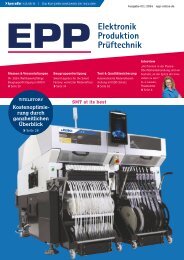cpp – Process technology for the chemical industry 02.2020
The journal cpp - Process technology for the chemical industry reports about processes, plants, apparatus and components for the chemical and pharmaceutical industry. Further topics are IT technologies, industry 4.0, digital production, MSR and automation technology and process analysis technology. The content spectrum is rounded off by explosion protection, plant safety, occupational health and safety, maintenance, site management and energy management.
The journal cpp - Process technology for the chemical industry reports about processes, plants, apparatus and components for the chemical and pharmaceutical industry. Further topics are IT technologies, industry 4.0, digital production, MSR and automation technology and process analysis technology. The content spectrum is rounded off by explosion protection, plant safety, occupational health and safety, maintenance, site management and energy management.
You also want an ePaper? Increase the reach of your titles
YUMPU automatically turns print PDFs into web optimized ePapers that Google loves.
<strong>cpp</strong><br />
INSTRUMENTATION, CONTROL, AUTOMATION<br />
Pictures: Pepperl+Fuchs<br />
The R2000 2-D Lidar scanner monitors <strong>the</strong> position of <strong>the</strong> fall protection device<br />
Factory automation sensors make <strong>the</strong>ir way into hazardous environments<br />
Explosion-protected<br />
housings are <strong>the</strong> solution<br />
Implementing automated processes in a plant requires suitable tools and components.<br />
Reliable sensors are among <strong>the</strong> most important of <strong>the</strong>se tools. For example,<br />
<strong>the</strong>se sensors help to monitor processes, detect and pass on in<strong>for</strong>mation regarding<br />
errors, and control process flows. To enable customers to use Pepperl+Fuchs<br />
sensors in explosion-protected areas, <strong>the</strong> company has made a range of selected<br />
factory automation sensors suitable <strong>for</strong> use in zones 1 or 21, and 2 or 22.<br />
Advancements in <strong>the</strong> automation of process<br />
plants have resulted in changes to customer<br />
requirements. It is becoming increasingly<br />
common <strong>for</strong> plants to be networked<br />
and automated, which subsequently<br />
increases <strong>the</strong> complexity of explosion<br />
protection. The complex requirements<br />
<strong>for</strong> explosion protection are not due<br />
to changes in processes in particular, but<br />
ra<strong>the</strong>r <strong>the</strong>y are due to <strong>the</strong> changes in technical<br />
capabilities in general. In turn, this<br />
means that approaches to problem solving<br />
are constantly changing, thus increasing<br />
<strong>the</strong> need <strong>for</strong> solutions that use tried-andtested<br />
industrial sensor <strong>technology</strong>, including<br />
explosion protection. One thing that is<br />
clear is that sensors that increase <strong>the</strong> productivity<br />
and safety of plants in factory<br />
automation can also be used in process<br />
automation. Difficulties implementing this<br />
<strong>technology</strong> are often due to <strong>the</strong> significant<br />
purchase and maintenance costs of sensors,<br />
and especially <strong>the</strong> complex approvals and<br />
certifications required <strong>for</strong> explosion protection.<br />
Customers often want sensors to<br />
be fitted in potentially hazardous locations,<br />
posing even greater challenges. Based on<br />
this premise, Pepperl+Fuchs engineers<br />
have developed a solution <strong>for</strong> optimising<br />
customer processes.<br />
Sensor <strong>for</strong> fall protection device<br />
This is demonstrated by a project undertaken<br />
with a manufacturer of fall protection<br />
systems <strong>for</strong> filling tankers with liquids. Fall<br />
protection systems are necessary because<br />
<strong>the</strong> process of filling tankers with liquid<br />
<strong>chemical</strong>s is not fully automated <strong>–</strong> instead,<br />
it is always carried out by workers on a<br />
plat<strong>for</strong>m. This means that one wrong decision<br />
by an individual can have far-reaching<br />
consequences <strong>for</strong> people and <strong>the</strong> environment.<br />
Pepperl+Fuchs helped <strong>the</strong>se customers<br />
to implement <strong>the</strong> existing process <strong>for</strong><br />
non-hazardous areas in hazardous areas.<br />
During this process, <strong>the</strong> R2000 2-D Lidar<br />
18 <strong>cpp</strong> 02-2020


